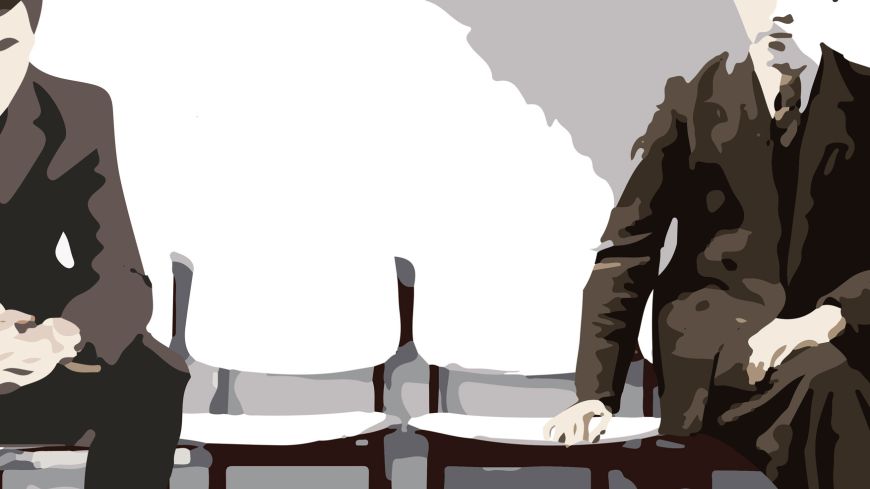
The pink candy stripes looks at first incongruous in the setting of a State mental institution till the eye adjusts to its being an American flag symbolically split over four sections of the white tiled wall.
This is the setting for Athur Miller’s penultimate play, The Last Yankee, revived by Rapture Theatre in celebration of the centenary of Miller’s birth and part of the 2015 Mental Health Arts and Film Festival.
Two very different men meet in a waiting room before visiting their wives who are patients being treated for depression. One is a class conscious, successful businessman with no children the other an egalitarian skilled carpenter with nine mouths to feed. Through their masculine chat, we learn that one has been an inmate several times while it’s the other’s first time. Each man is equally bewildered as to the root of his wife’s condition and though neither is overtly cruel or deliberately unkind, their clumsy efforts at kindness are seen as such through a feminine prism. Conversely the women who have been finding comfort in each other’s company suddenly look foolish when their means of finding peace of mind is exposed to their husbands’ scrutiny.
Leroy Hamilton (David Tarkenter) is the eponymous last Yankee with roots going back to one of America’s founding fathers and supporter of independence but who as eschewed his roots by trying to live a modest life as a carpenter. His wife Patricia (Pauline Turner), comes from Swedish immigrant stock, so carries in her genes a very different American history.
The main thrust of the play is the probing interaction between Leroy and Patricia, strongly played out by Tarkenter and Turner, as they try to resolve conflicting perspectives and step off to claim a more optimistic solution to living together. But it is Jane McCarry’s Karen, a woman referred to by her husband as ‘mine’, who has swapped her washed out clothes and flea in a blanket mind for the focus and glamour of tap dancing as she seeks vulnerable approval like a child only to have the joy sucked out by Frick’s thoughtless indifference that breaks the heart.
The issues thrown up by the play about the effects of inevitable relationship problems when residual bitterness goes unresolved are as pertinent now as ever. We like to believe we are more enlightened with the existence of the likes of CALM (campaign against living miserably) aimed particularly at men. Yet the constant near immobile presence of the bedridden patient (Natalie Clark) is a stark reminder of the depression’s debilitating effect on some, no matter the gender, in this thought provoking piece of theatre.
Tour continues till 07 November

